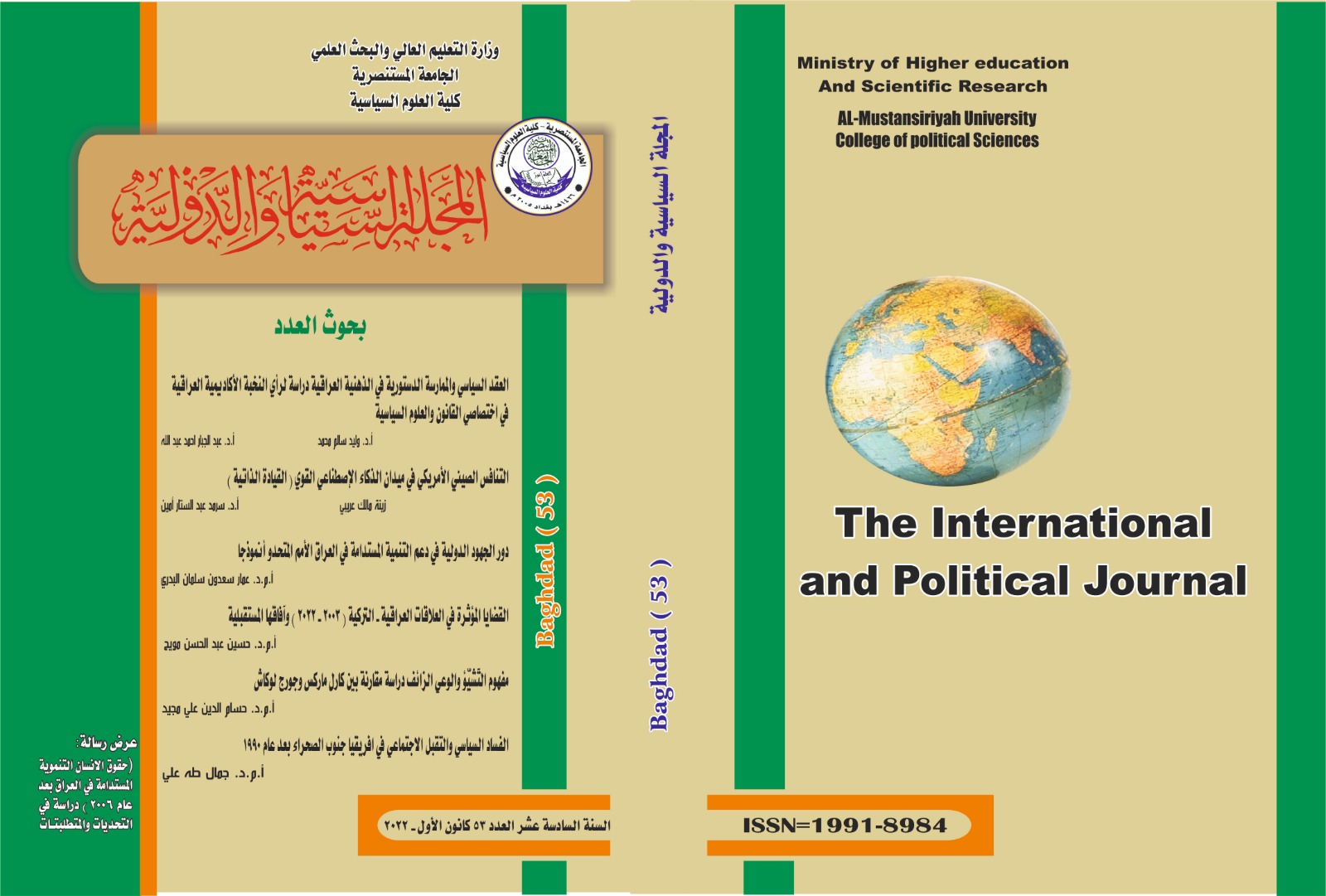The future of power Joseph S. Nye Jr.
Abstract
The first part of the book bears the title (Patterns of Power), which deals in the first chapter, its general idea, and distinguishes between hard power (economic and military), and soft power “the ability to influence others through common means of framing the agenda, persuasion, and elicit positive attraction from In order to obtain preferred results", the smart power (a combination of the two). In Chapter Two ("Military Power"), Nye argues that military power depends largely on context, and that militaries need to be increasingly versatile to deal with very different types of issues, ranging from classic warfare to counterinsurgency. , humanitarian intervention and the provision of aid and relief. The author repeats his basic argument when declaring that while military power is still decisive in world politics, it is no longer sufficient to achieve victory, as evidenced by the difficulties the United States and NATO have faced in winning the hearts and minds of the peoples of Afghanistan and Iraq. In Chapter Three on Economic Power, Nye clarifies the fact that economic power is a prerequisite for both (military) power and soft power. In this chapter in particular, the book feels like a textbook, providing basic principles of sanctions, assistance, etc., underlining its intention to provide an introductory text suitable for those with little prior knowledge of international affairs. Chapter Four (“Soft Power”) is interesting because Nye discusses how China has been one of the most enthusiastic international actors to embrace the concept, and how the Chinese government’s willingness to develop an engaging narrative influences its foreign policy, which is one of the actual policy recommendations. Few here are in empowering the US State Department and creating a more centralized public diplomatic apparatus. In the second part of the book, "Power Shifts Between Diffusion and Transmission," the author dwells on how Facebook and Twitter are changing our lives, but this is rarely news to the reader. As early as the 2000s, Nye wrote about the fact that non-state actors are becoming increasingly important, without that implying the end of the state's existence as a major actor in the global system. He makes an interesting point that the internet and social media are in no way tools meant to mobilize good causes, but can also help repressive governments undermine movements. For the opposition, Nye raises important and interesting questions regarding how to think about “hack,” what role should governments play in cyberspace?, and how should the threat of economic espionage, cyberwarfare and cyberterrorism be dealt with? He argues that while cyberspace will strongly influence international politics, it is "unlikely to be a game-changer in power shifts" in the coming decades.The book concludes in its third and final part under politics, in which it deals with policies and strategies that employ the use of forms of force in achieving foreign policy goals. While the book is very well written and very easy to read, the reader gets the impression that in trying to address the general, non-expert audience, Nye often remains on the surface, careful not to make any controversial statements. This is particularly the case in Chapter Six, where he briefly analyzes the positions of different countries, and only summarizes the general wisdom without presenting his view to the end. Nye argues that a one-dimensional extrapolation of Chinese growth is unrealistic and predicts that the United States will remain the most powerful country in the world by The year 2050 - provided that the mistakes of the years of the administration of former US President George W. Bush are not repeated. In short, despite some loopholes, Joseph Nye's latest book provides an interesting overview of international politics, but given the author's extensive knowledge he could, in several respects, provide a more in-depth analysis.
Additional Files
Published
How to Cite
Issue
Section
License

This work is licensed under a Creative Commons Attribution-NonCommercial-NoDerivatives 4.0 International License.
Journal Policies
All articles published in the International and Political Journal are licensed under a Creative Commons Attribution 4.0 International License. This means that the Authors can:
The journal allows reuse and remixing of content in accordance with a Creative Commons license.
Copy and redistribute the material in any medium or format.
Policy of publishing in The International and Political Journal
The journal is committed to the ethics of scientific publishing, and according to the publication ethics report of the journal.
The decision to publish is based on the value of the scientific research, to what extent it meets the conditions of publication approved, the declared policy of the journal, and its specialty.
It is based on the principles of the scientific honesty, and originality of research submitted for publication. It deals with the names of reviewers and their reports with great confidentiality.
The opinions published in the journal reflect the views of the authors, and not necessarily reflect the opinion of the editorial board.
The journal does not adhere to the publication of whatever comes to it. The time and place of publication are subject to technical considerations adopted in the editorial plan of the journal.
The journal does not abide to return the research papers to their owners whether accepted for publication or not.
The researcher is to be provided with the acceptance of publication within about 24 WEEKS. As for publication, the editorial board reserves its right in priority of publishing. The arrangement of the research papers in the same issue is subject to technical standards.
Diversify of publishing papers from solid universities and scientific centers from inside and outside Iraq is preferable.
The journal maintains hard copies and electronic archive of the published issues in addition to the publication of the research papers.
The journal also publishes the issues electronically through the website of the journal, and the official website of the Iraqi academic journals, and makes it possible to download. Thus, documenting the intellectual property of the research papers and publishing them internationally is achieved.
Terms of publication may be modified when necessary with no previous notice.
The researcher obtains a copy of his research paper. If he wishes to buy acopy of the journal, the volume costs ID 10000 from inside Iraq and $8from the outside.
The Editorial Board considers that the researcher who submits his research paper for publication in the journal has already read the terms and conditions of publication and agreed on them.
The journal publishes the research papers of the postgraduate students in special issues for this purpose.
Stages of editing and publishing:
The researcher undertakes that his research has never been published before, and has not been submitted for publication to other sides until the end of the evaluation procedures and the acceptance of publication in the journal.
The research papers submitted for publication are to subjected for preliminary examination by the editorial board to determine their suitability for the journal specialization, its policy and the safety of scientific research procedures, and then to indicate its eligibility for scientific evaluation. The editorial board may apologize for accepting the research all together or require the researcher to amend it in accordance with the journal policy before sending it to editors.
After conducting the scientific evaluation, the research paper returns back to the researcher to make the required amendments within a maximum of two weeks.
A copy of the final research paper is to be submitted to the secretariat of the journal a hard copy and a soft copy on a CD, in both Word and PDF format. The researcher is fully responsible for the typing and linguistic mistakes after submitting the full research paper on a CD.
Plagiarism checker
All research papers are subjected to Turnitin program to uncover plagiarism before being sent to scientific evaluation. The researcher undertakes a written pledge to take the legal and moral responsibility, in the event of the emergence of plagiarism or taking from the efforts of other researchers, without a reference to them. The journal uses appropriate anti-plagiarism software, such as Turnitin to check for plagiarism.
Dealing with Allegations of Research Misconduct
The Journal shall take reasonable and serious steps to identify and prevent the publication of papers where research misconduct has occurred, including plagiarism, citation manipulation, and data falsification/fabrication.
Scientific Evaluation:
Scientific evaluation strengthens the research paper submitted to the journal and helps to take the appropriate decision by the editorial board to publish it. It also benefits the researchers to improve and correct their research papers.
The research paper is sent to three evaluators in the same specialty to evaluate












